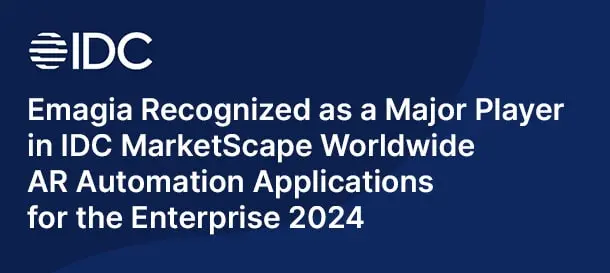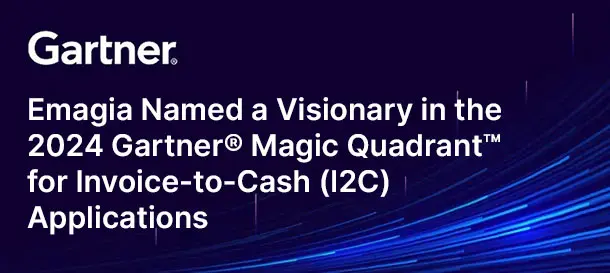Artificial intelligence (AI) is no longer a futuristic concept—it’s here, and it’s reshaping industries across the globe. That is not to say AI’s emergence in business and finance won’t cause problems if used improperly, warned Wanda Borges, Esq., a legal expert with more than three decades of experience during a recent episode of the Emagia AI for Finance podcast.
Borges, the principal of Borges & Associates LLC, a New York-based law firm specializing in commercial litigation and creditors’ rights, shared her insights on the intersection of AI and finance, addressing from a legal standpoint the opportunities and challenges that financial leaders must consider when integrating AI tools into their operations.
AI’s Growing Presence in Finance
Before 2023, AI was mostly a theoretical topic, often linked to science fiction. However, the launch of tools like ChatGPT finally catapulted AI into mainstream conversation. Borges noted that while many credit professionals had little knowledge of AI in years past, the rising interest in the technology is undeniable.
“A year ago, people were asking, ‘What is it and how does it work for credit?’” Borges explained. Now, the conversation has shifted to “How can AI benefit my work and my organization?”
Despite growing enthusiasm, there remains hesitation in fully adopting AI. Borges pointed out that while many people understand its potential, others are reluctant to embrace it, particularly in the credit industry where AI is still in its infancy.

Caution: Legal Risks and Pitfalls
While AI presents numerous advantages, it’s not without its risks. Borges recounted a troubling story about a law firm where a junior attorney used ChatGPT to write a legal memorandum. During court proceedings, the opposing side discovered that several cases cited in the memorandum were fabricated by the AI. This mistake led to the firm’s loss and disciplinary action against the involved attorneys. Borges stressed that AI-generated content must always be carefully reviewed for accuracy.
It is a clear reminder: AI should be viewed as a tool, not a replacement for human expertise. Think of AI as a copilot or a tool in the toolbox in reducing manual and redundant processes, not a silver bullet to fix all problems.
Ensuring Fairness and Avoiding Bias
AI’s ability to process vast amounts of data can significantly improve credit decision-making. However, Borges cautioned that AI can unintentionally perpetuate bias if not closely monitored. “AI could accidentally be prejudicial or discriminatory,” she explained. Without careful oversight, AI may cause credit to be denied for non-legal reasons, potentially leading to claims of unfair treatment or violations of regulatory standards. This highlights the importance of maintaining a human check on AI-driven processes to ensure fairness and compliance.
Embracing AI in Credit Decision-Making
AI’s potential to play a transformative, if not revolutionary, role in credit management is becoming increasingly clear. Borges predicts that credit professionals will increasingly use AI in credit assessment, especially as credit departments face staffing cuts and greater pressure to make decisions more efficiently.
“AI can help prioritize tasks and assess creditworthiness more accurately,” she said. By analyzing patterns such as late payments over time, AI can assist credit executives in making more informed decisions, ultimately leading to greater operational efficiency.
In the future, Borges envisions AI expanding its role to include predictive analytics, helping credit teams foresee potential financial difficulties or liquidity issues.Such a shift would enable credit professionals to more proactively address risks and make data-driven decisions.
The Path Ahead: Adoption and Integration
Despite some resistance, Borges believes those who don’t adopt AI will be left behind.
“Whether you use AI a little or a lot, you have to embrace it,” she stated. “AI is not a passing trend but an essential tool for modern finance professionals.” As credit executives explore AI’s potential, the key is to understand its capabilities (and limitations) while ensuring that its use aligns with legal standards.
- Credit Assessment: AI can enhance decision-making by automating the analysis of creditworthiness.
- Predictive Analytics: AI tools can identify early warning signs of financial distress.
- Operational Efficiency: AI can assist with tasks like preference analysis, reducing the burden of manual work.
FAQs
What is ChatGPT?
Developed by OpenAI, ChatGPT is an AI-driven chatbot that uses large language models (LLMs) to generate text-based responses. Launched in late 2022, it quickly gained popularity for its ability to write, edit, and answer complex queries. In 2024, ChatGPT was integrated with Apple’s operating systems to enhance user interaction.
What is Emagia’s GiaGPT?
GiaGPT flagship generative AI solution for autonomous finance. Its aim is to empower finance operations executives with simple and fast analytics using easy natural-language chat. Insights can be obtained quickly in easy-to-understand summaries, as well as colorful visual graphs and plots. GiaGPT is a copilot analyst for finance leaders focused on making rapid data-driven decisions to run efficient operations.




